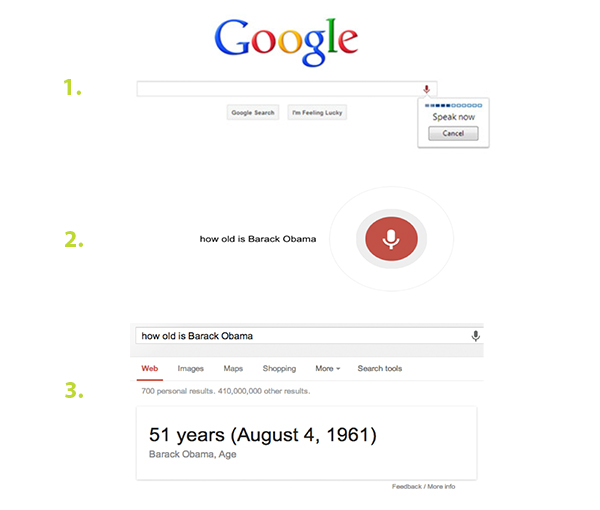Last Updated on August 11, 2023
Google Hummingbird (in analogy with the bird’s speed and accuracy) is the latest Google’s search algorithm. Hummingbird has been published in August (or beginning of September) but has only been announced on 2013/09/26. It would concern 90% of the world’s queries, even though its impact remains rather discreet.
Contrary to Google Penguin and Google Panda, Hummingbird is not based upon penalty but upon search results’ relevance. Its main function would be to improve the pages’ relevance in particular for conversational search: when the query is done in the form of conversation (ex: “How old is Barack Obama?” instead of “Barack Obama age”). The objective is to better understand the surfers’ requests in order to give them the most appropriate answers. This has become all the more imperative since more and more users are using the vocal search, especially when mobile.
Conversational search
When submitting a query to Google, on Google Chrome, users have two choices: either typing into the search box, either asking their question aloud by clicking on the microphone. When Google knows the answer (if it is in its Knowledge Graph), the user will find an Information Card summing up the information he is looking for. The more conversational the query, the more information is provided.
In concrete terms, Google will now try to answer the whole meaning of the request rather than find the page that matches these words the best. Indeed, the meaning of the request can be understood thanks to some words but the best answer does not necessarily come from the page that uses all these words.
For instance, according to Danny Sullivan, when typing “ What’s the closest place to buy the iPhone 5s to my home? ”, Google would before find pages including “buy” and “iPhone 5S”. Now, Google would be able to understand that in this sentence, \”place\” means \”shop\” and would answer to the whole request rather than chase the specific keywords separately, especially if the user already indicated where he lives. These changes would lead to believe that Hummingbird affects long tail requests above all and that it has almost no effect on “big” requests, those who generate traffic the most, which would explain why they went unnoticed.
Synonym identification based on co-occurring terms
Bill Slawski found a patent recently obtained by Google (\”Synonym identification based on co-occurring terms\” 2013/09/17) that really looks like Hummingbird’s functioning. But it is not sure whether or not they are truly linked. The example given by the patent was the following query: What is the best place to find and eat Chicago deep dish style pizza?
The algorithm studies all the terms that co-occur with the other request’s words. It is thus possible to see that a lot of users use the word “restaurant” when they make queries about places where to eat pizzas. People writing contents on this topic also use this term.
“Synonym identification based on co-occurring terms” patent schema
What impact?
The major impact of this change is that the website’s content is getting more and more important. Quality, rich and relevant contents will be favoured to poor contents full of keywords.
The bad news is that, as explained before, Hummingbird is supposed to answer our questions thanks to an Information Card, displayed at the top of the results page. In other words, Hummingbird will “steal” the information from rich content websites conscientiously optimising their SEO, and often paying a lot for that, to answer users’ questions first. Users won’t have any reason to click on those websites offering reliable information for free expecting in returns some CTA from their visitors.
What to do?
Regarding Google\’s competition, there is unfortunately little to do. However, if you want to compete with other websites for traffic, here are some advice to follow:
– Adapt your keywords strategy for natural language requests. Try to determine all the natural expressions that people would use when looking for your services.
– Broaden the semantic field of the page’s content selecting your keywords but also their synonyms and similar words. To do so you can for instance use Google Webmaster tool, synonym and analogical dictionaries or Google Suggest.
– Force co-quotations (“from the same author”, “about the same topic”, … ). Co-quotations enable to link two documents from third documents’ quotations. Every time your brand is mentioned next to your competitors, Google will think that your company and these other companies are linked.
– Attach importance to Universal search: search results made of different media (Web, images, video, news, …). It is highly probable that Hummingbird improves the relevance of users using universal search more often.
YOU MAY ALSO LIKE
- schools marketing
- baidu ppc
- seo services for small business
- wechat shop
- Wechat Admin Platform
- baidu webmaster
- baidu ad
Our Services:



